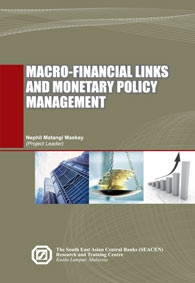For the past few decades the nature of links between financial conditions and the real macro economy (the macro-financial link) has changed. The links have expanded and deepened significantly due mainly to the following two reasons. Firstly financial liberalisation has expanded the availability of financial products and services increasing the connection between financial markets which in turn has enhanced the channels through which financial conditions affect the real macro economy. Secondly financial globalisation has amplified the adverse effect of financial contagion from one country to another and subsequently a financial crisis or turmoil in one country tends to easily affect the financial markets and the real macro economy of other countries through the above mentioned macro-financial links. The current US sub-prime mortgage crisis is a case in point of how the US financial crisis adversely affected not only its domestic financial system and economy but also the global financial system and economy. However the current understanding of how the financial conditions affect the real macro economy seems to be insufficient. In particular it is becoming more important to comprehend how monetary policy influences financial conditions. In light of these issues this study explores the implication and nature of macro- financial links of SEACEN central bank policies and reviews the experiences of participating countries. The study highlights that the function of allocation of resources in some SEACEN members has expanded and broadened beyond that of the monetary and financial system as a whole. This suggests that monetary policy management needs to be better coordinated and fine-tuned. The paper thus proposes that the country-specific formulation and implementation of monetary policy should be coordinated with financial policy.
-
About Us
-
Events
-
Publications
-
About The SEACEN Centre
-
The Centre's Governance
-
Courses

